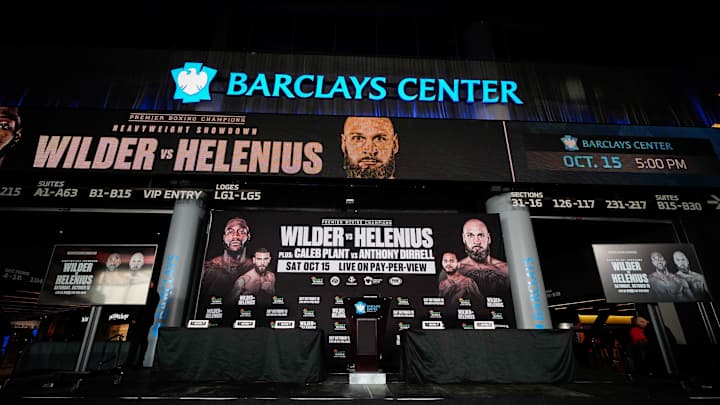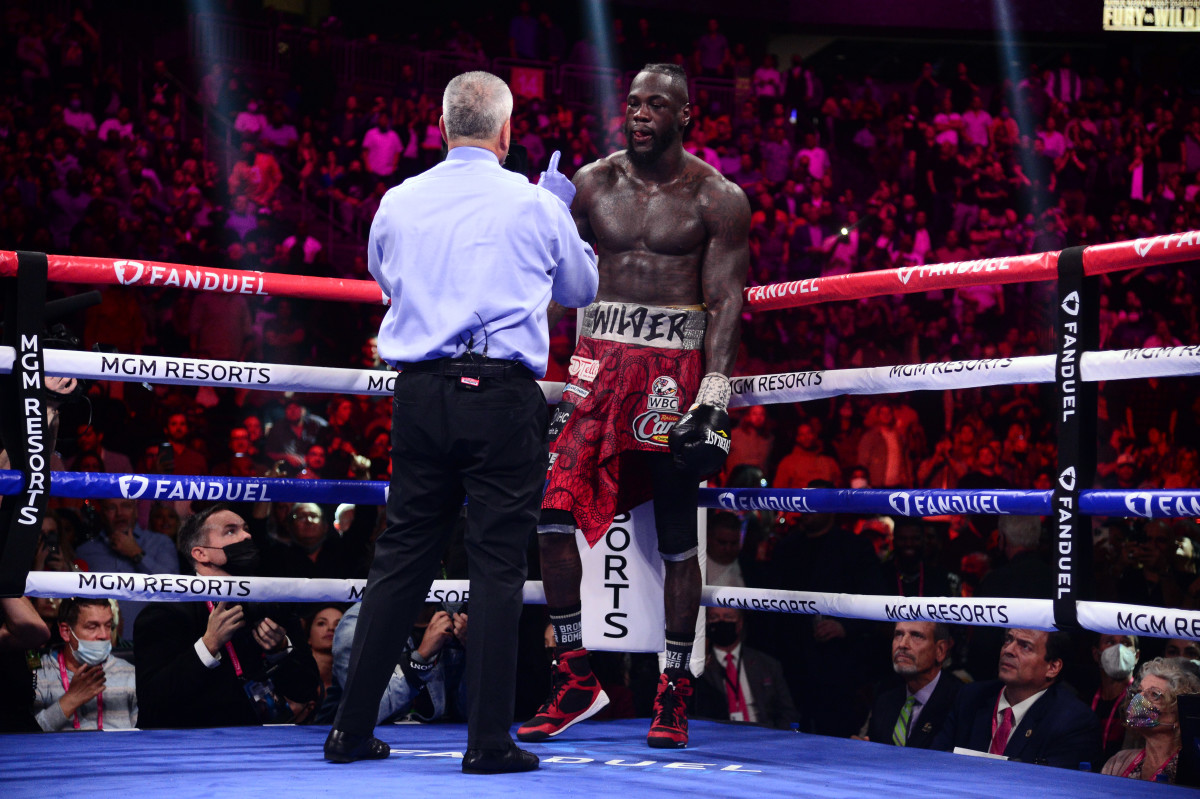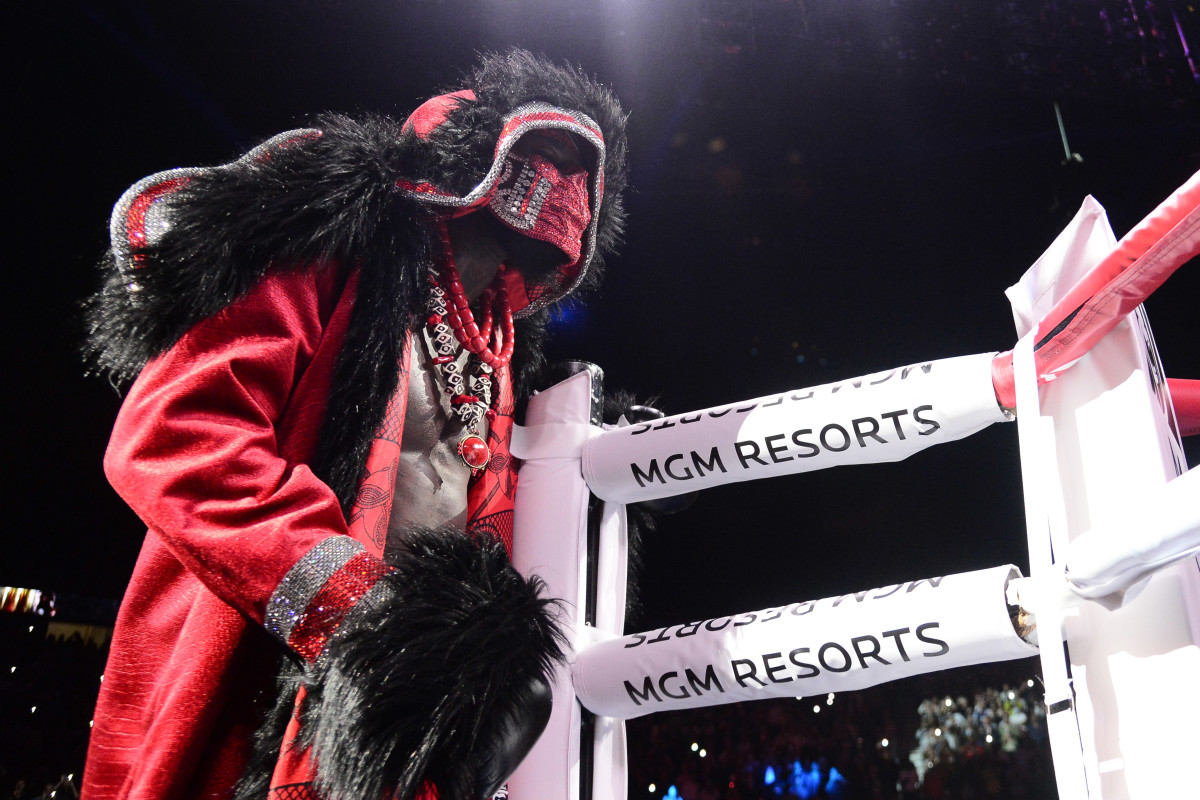A Flurry of Questions Remains About Deontay Wilder’s Return to the Ring

It has been home to a handful of Deontay Wilder’s greatest triumphs, so it was no surprise that when Wilder’s next fight—a tasty clash with veteran heavyweight Robert Helenius, scheduled for Oct. 15—was announced the Barclays Center was tabbed to host it. At Tuesday’s kick-off press conference, it was expected Wilder would recall a few of his signature wins, from a bludgeoning of Bermane Stiverne to a come-from-behind win over Luis Ortiz to his one-punch knockout of Dominic Breazeale.
Only problem: Deontay Wilder didn’t show up.
Travel issues, a PBC official explained, necessitated Wilder to address a few dozen pizza-chewing media from a monitor. A relaxed Wilder fielded a few questions from the PBC emcee via satellite.
“This next reign is going to be a special one,” Wilder says. “It’s going to be dedicated to the people.”
It has been 10 months since Wilder’s last fight, a nasty knockout loss to Tyson Fury that buttoned up one of boxing’s great heavyweight rivalries. Wilder has largely disappeared since then, popping up on the occasional podcast, and posting the periodic family photo on social media. He recorded an album, was honored by Tuscaloosa with a seven-foot tall statue and hung out with celebrities like Shaquille O’Neal and Dave Chappelle.

He did not, however, spend much time thinking about boxing.
His words. Not mine. Asked whether he was anxious to again showcase the crushing power that made him one of the biggest punchers of this generation, Wilder shrugged.
“To be honest, I haven’t missed [boxing] at all,” Wilder says. “Many times I have sat around and contemplated, Do I need to come back or not? Because I have done so well for myself outside of the ring to the point where I don’t need boxing. Financially, I have won all the way around.
“I had to think long and hard about a lot of things because of the position that I’m in. I used to have that itch, that feeling about going getting back in the ring. I went to the gym a couple of times to try and get that feeling. I couldn’t find it. That feeling wasn’t there no more.”
The feeling, Wilder says, began to resurface last May, when Tuscaloosa, his hometown, unveiled an 830-pound statue (bronzed, naturally) in front of the city’s offices for tourism. Wilder, visibly moved, noted the statue had been erected “right down the street from where they used to sell slaves back in the day” and not far from where a century-old monument dedicated to Confederate soldiers had been removed two years earlier.
“[That] let me know there was more work to do,” Wilder says. “I’ve got to continue to fight, to motivate, to inspire. I got to come back.”
So Wilder is back.
Now the question is what, at 36, he has left.
Over three years, Wilder boxed 30 rounds with Fury. The last 18 were especially brutal. In 2020, he was dropped twice before his then trainer and former welterweight champion Mark Breland threw in the towel to prevent a third. He was put down three times by Fury last year, the final time from a skull denting right hand that sent Wilder careening face first to the canvas.

Those around Wilder, predictably, insist he is sharp. His trainer, Malik Scott, says Wilder has looked stronger, more agile and more motivated than ever before. In an effort to shake things up, Wilder has trained in Las Vegas, working out routinely at the UFC gym, emphasizing conditioning while sharpening new tactics with Don House, a cut man and trainer who joined Wilder’s team before his last fight.
“Trying something different,” Wilder says. “When you are in a business for so long, with the same routine, sometimes it can get boring.”
Wilder looks good. He sounds good. But is he good? It’s unknown what, if anything, Fury took out of him. On paper, Helenius is the perfect comeback opponent. He’s credible, courtesy of back-to-back knockouts of shaky-chinned, former contender Adam Kownacki. But he’s 38, and before this recent revival he was knocked out by Gerald Washington. Anything close to the Wilder of years past should drill him.
Does Wilder still have the fire? He used to. Back when he was a football star turned boxer who picked up the sport as a means to take care of his family. Back when he stormed onto the USA Boxing scene on his way to a bronze medal at the 2008 Olympics. Back when he faced scores of skeptics who didn’t believe this raw prospect could turn into the heaviest hitter since Mike Tyson.

Is that fighter still there? Wilder said it: He doesn’t need boxing. He’s already won. He earned tens of millions fighting Fury, ensuring his family financial stability for generations to come. He has held the heavyweight title. He has fought on the big stage in front of big crowds. Getting back to that level won’t be easy. Wilder will need to be dedicated to do it.
If he is, Wilder will spice up an already interesting heavyweight scene. Fury is entrenched at the top, but there are plenty of appealing opponents underneath him. If Wilder beats Helenius, Andy Ruiz Jr., a former titleholder who will square off with Luis Ortiz on Saturday, could be next. Derek Chisora, the faded ex-title challenger, has called him out. And while a showdown with Anthony Joshua doesn’t have the same sizzle it once did, a fight with Joshua, himself rebuilding after back-to-back losses to Oleksandr Usyk, is still among boxing’s most marketable.
So we’ll see. On Tuesday, Wilder appeared happy. He smiled when discussing his children’s response to his return. “I think they like seeing their father in the spotlight,” Wilder says. He praised Helenius, a former sparring partner, for his perseverance. “Your heart will tell you that you can’t quit,” he continued. “You’ll die for this.” He spoke of the responsibility he feels to set an example for other fighters.
“The Bronze Bomber is back, baby,” Wilder says.
On Oct. 15, he is.
By the next day, we’ll know more about whether he’s here to stay.
More Boxing Coverage:
